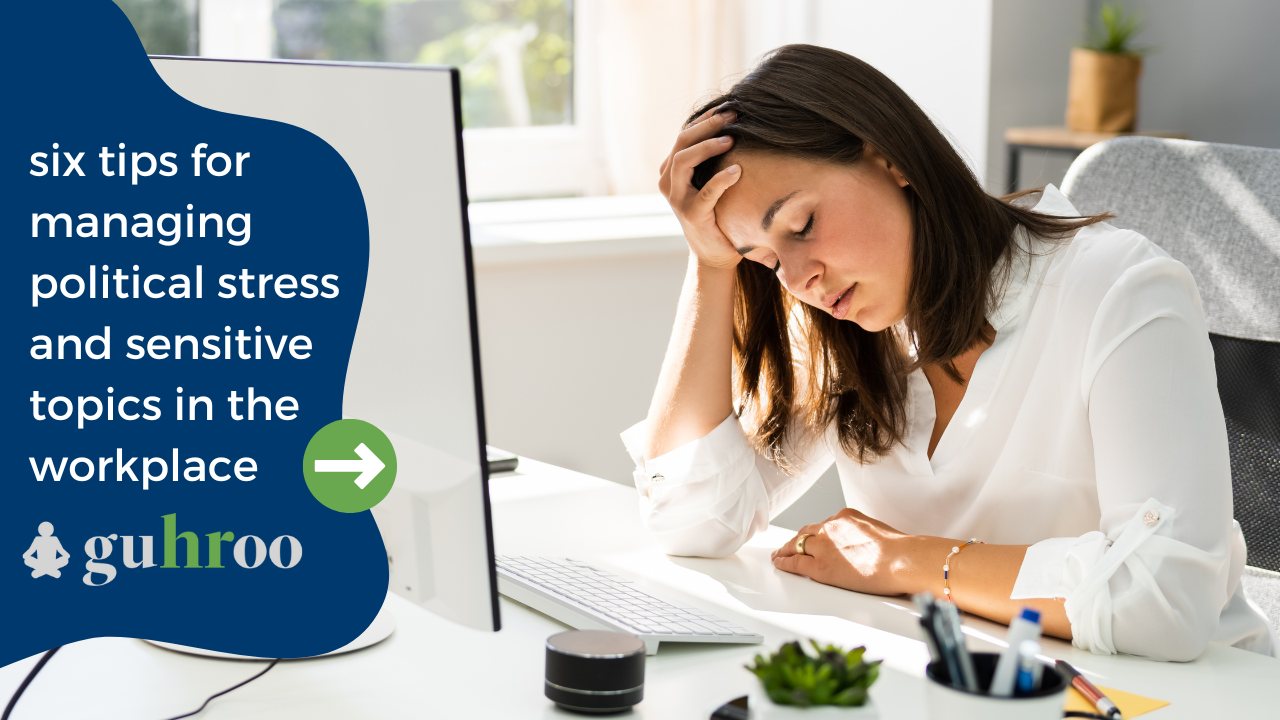We’re all supposed to feel stress in the workplace from time to time. It’s the way the body responds to demands and dangers. During such a time of political anxiety, the stress we feel during the workday may be heightened. A stressful event triggers the release of hormones. These hormones, according to Psychology Today, “increase heartbeat and the circulation of blood to support quick action, mobilize fat and sugar for immediate energy, focus attention to track the danger, prepare muscles for movement, and more.” This fight-or-flight response helps us overcome these challenges. It can save our life before we realize we’re in danger.
We are not, however, supposed to feel stress all or most of the time. Stress, particularly the regular or chronic variety, can lead to illness and other mental and physical health problems. As Sarah Noll Wilson notes, stress also makes it more difficult for us to access higher-level brain functions like logic, reasoning, problem-solving, listening, and empathy—all of which are useful for managing stress. (especially during the most recent political news)
It’s no secret, unfortunately, that many of us live overly stressful lives, more so now that we’re in the midst of a pandemic and with some of the most recent political news. Some days we may feel overwhelmed by stressful situations and overloaded with stress hormones, and it’s no mere coincidence that on these days we seem less able to think clearly and work collaboratively. We’re literally chemically hindered from doing so.
Impacts of stress in the workplace on employees during a time of political anxiety
The workplace is a high-risk environment, especially when the news headlines are consumed with political conflict.
In addition to common workplace stressors, there are less-noticed ones. Feelings of loneliness and isolation can add to a person’s stress in the workplace, as can mental conditions like depression, anxiety, and OCD. Employees without a strong support network or those experiencing mental illness may have an even more difficult time managing common workplace stressors. Worse, their additional struggles are often invisible to managers and peers.
Similarly, managers and peers are often unaware that some employees are experiencing the stress of microaggressions (explained below) and subtle forms of oppression and discrimination. In an interview with Forbes, Minda Harts explains what it’s like to be the only or one of only a few women of color in the room: “After a while, you just start to settle into the microaggressions, you start to settle into the isolation, and you start to question everything you’re doing, and your expertise.”
And now, added to the mix, is the COVID-19 pandemic, which, to quote Sarah Noll Wilson, means “living with the constant hum of a threat” and with fewer moments “where our brain can properly rest while we still go about our day.” That’s a big issue. Chris Weller at the NeuroLeadership Institute writes, “Just as a sponge can only soak up so much water, and a computer can only process so much information, our brains have finite holding power. After a certain point, we all need to stop working, rest, and recharge.”
What employers can do to make the workplace less stressful during challenging political times
Not all stress in the workplace can be eliminated, but some can. Political anxiety can cause extra stress during the workday. Encourage your employees to stay on task and away from the news channels and media outlets in order to limit the stress of knowing “what’s happening now”. They can always catch up after work. Let them know if anything critical happens that they need to know about, you will certainly keep them “in the know”. In any case, stress can be managed. It doesn’t have to have the last word. Here are some practices that can help make the workplace less stressful:
Don’t assume the worst.
Because the workplace is home to so much stress, it’s easy to grow cynical about the employment relationship. It’s true that there are bad employees, horrible bosses, and toxic cultures. Workplace problems can be entrenched and systematic. Nonetheless, the employment relationship isn’t uniquely bad among human relationships, and it’s a mistake and counterproductive to think it is. There are star employees, terrific bosses, and great places to work—and these aren’t rare.
Assuming the worst about employers or employees, or seeing them primarily as threats or liabilities, is like assuming all your friends are going to betray you. It’s an attitude that creates more drama, adds more stress, and ruins otherwise functional relationships. So, as Cy Wakeman says in her book No Ego, “stop believing everything you think.” Instead, advises Wakeman, ask yourself what you know for sure and base your thinking and your decisions on what is, in fact, real. Tell your employees to do the same.
Always act in good faith.
There are times when the right thing to do is going to cause someone stress. For employers, it might be discipline for a policy violation, a poor performance review because of unmet expectations, or a layoff due to a shortage of work. For employees, it might be providing candid feedback to a peer, asking a coworker to cover a shift, or setting a hard deadline for a project.
At some point, you’re going to cause someone stress, and that’s likely okay. The important thing is not to try to spare people the necessary stress, but to approach decisions that will cause someone this stress in good faith. Good faith shows that you care about their success and wellbeing. It also helps put others in a better frame of mind to accept the demands or pressures placed upon them.
Address sexism, racism, and other forms of inequality.
These are stressors that every employer should be acknowledging and working to eliminate. Unlike other stressors, they are not inevitable.
Microaggressions, in particular, deserve to be called out. Writing in Harvard Business Review, Ella F. Washington, Alison Hall Birch, and Laura Morgan Roberts explain that microaggressions are “verbal, behavioral, and environmental indignities that communicate hostile, derogatory, or negative racial slights and insults to the target person or group. For Black people, they are ubiquitous across daily work and life.” These indignities are not “small,” as the term micro might seem to imply, but rather frequent and casual.
The authors cite research suggesting that “subtle forms of interpersonal discrimination like microaggressions are at least as harmful as more-overt expressions of discrimination.” For one thing, continual hostility and discrimination rob people of the time and space they need to rest and recharge.
In these situations, employers have a responsibility not only to help employees manage their stress but also, and more importantly, to do everything they can to put a stop to the hostility and discrimination that’s causing the stress. Sexism and racism, subtle or overt, must not be tolerated.
Promote support networks.
We’re not meant to struggle with stress alone. We need others, and they need us. You can facilitate friendships and support systems among employees by setting up virtual chat programs and video conferencing apps (and in-person spaces for fun when the pandemic is over). Reassure employees that it’s fine for them to take a little time during the workday to reach out to others about non-work matters and participate in virtual games and other fun group activities. Managers can set the tone by participating in these chats and activities and encouraging employees to join in.
Provide mental health benefits, if possible.
In some cases, employees who want to get the mental health care they need can’t afford the costs. Losing pay from a missed work shift might be too great a hardship, and effective treatments might be financially out of reach. These financial hindrances can exacerbate stress. In other cases, employees can afford the time off and the treatments, but they can’t make regular appointments work with their schedules. If you can offer paid time off, health insurance benefits, or flexible schedules, these can help employees get the care they need.
An Employee Assistance Program (EAP) may be another great option for employees feeling overwhelmed by stress. It gives employees access to expert, confidential assistance for substance abuse issues, relationship troubles, financial problems, mental health conditions, and other major stressors.
Give people permission and time to rest and recharge.
When a workplace situation causes someone to have a fight-or-flight response, it may be best for them to remove themselves from the situation before they say or do something they later regret or that causes more harm. Make sure employees know that they can remove themselves from an overly stressful situation. They shouldn’t have the added stress of worrying that they’ll be punished for doing what they need to do to de-escalate the situation or get away from it so they can calm themselves and refocus.
Aside from allowing these in-the-moment decisions to pause and step away, consider setting time aside during the week or month for employees to participate in activities like yoga, meditation, and mindfulness. There are known techniques, such as deep breathing, for eliciting a relaxation response when someone is experiencing stress. Educate yourself and your employees on these healthy practices for managing stress.
More About guHRoo (formerly ERG) Payroll & HR Services
If you are interested in learning more about HR Solutions For Small Business check out our video.
or visit our HR Resources page for more business resources.




